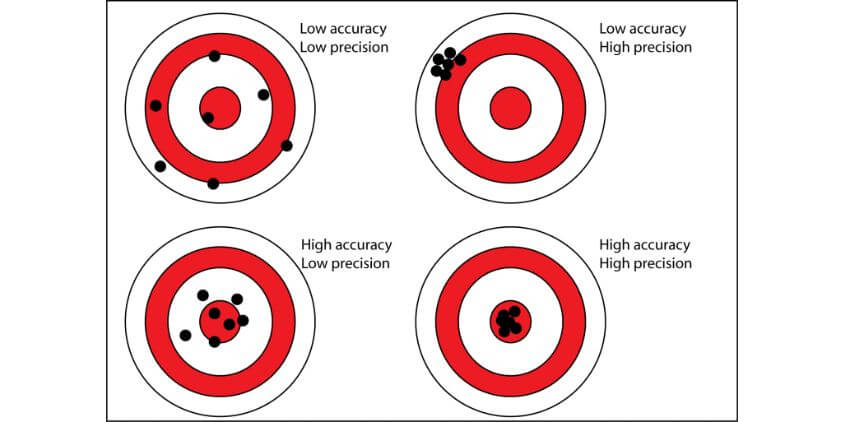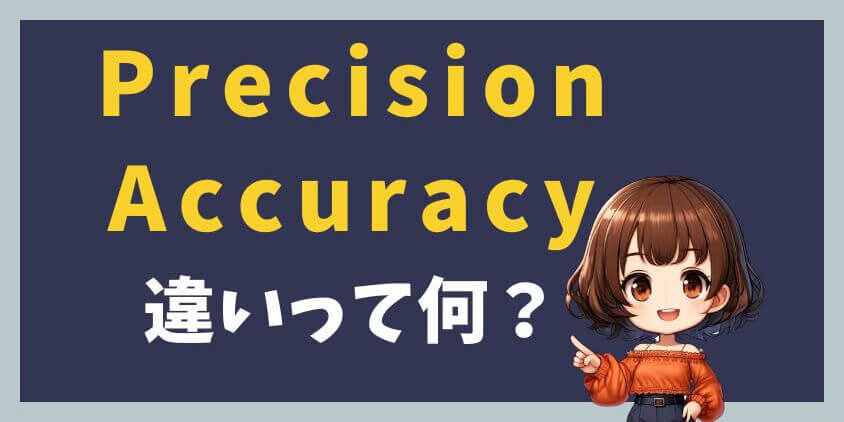今日は、英語でよく出てくるけれど、ちょっと分かりにくい単語、precision と accuracy の違いについて解説します。
日本語ではどちらも「精度」と訳されることがありますが、実は意味が全く異なるんです。
この記事を読めば、この2つの単語を自信を持って使いこなせるようになりますよ!
precision と accuracy のポイント
まずは、それぞれの単語のポイントを整理しましょう。
- Precision (精度): 何回も同じことを繰り返したとき、結果がどれだけ近いかを表します。
- Accuracy (正確さ/正確度): 結果が、正しい値(真値)にどれだけ近いかを表します。
少し難しいですか?大丈夫!これから、例を挙げながら詳しく説明していきます。
Precision(精度)とAccuracy(正確さ)の意味

引用元:Precision and accuracy in glacial geology
Precision(精度)
精度とは、測定や実験の結果がどれだけ一貫して再現可能かを表す言葉です。
例えば、的の中心から少し離れた場所に毎回同じように矢が当たる場合、その射撃は正確ではないけれど、精度は高いと言えます。
つまり、結果がどれだけバラバラにならずに、まとまっているかが精度を表します。
Accuracy(正確度/正確さ)
正確度/正確さとは、測定や実験の結果が真の値にどれだけ近いかを表す言葉です。
例えば、的の中心に矢が当たれば、その射撃は正確度が高いと言えます。中心に近ければ近いほど、正確度が高いことになります。
違いの上手な覚え方
アーチェリーで考えてみる
precision と accuracy の違いを覚えるには、アーチェリーの的を思い浮かべると分かりやすいでしょう。
- Precision (精度): 矢が的の同じ場所に集まっている状態。
- Accuracy (正確さ/正確度): 矢が的の中心に近い状態。
つまり、矢がまとまっていても中心からズレていれば「精度は高いけど、正確度は低い」、逆に矢がバラバラでも、平均すると中心に近い場合は「精度は低いけど、正確度は高い」となります。
時間の計測で考えてみる
時間を測る例で考えてみましょう。
ストップウォッチで100m走のタイムを測るとします。
ストップウォッチの表示は100分の1秒まで正確に測れても、ストップウォッチ自体が少しだけ遅れていたら、毎回同じようにズレた時間を計測してしまいます。この場合、「精度は高いけれど、正確度は低い」と言えます。
逆に、ストップウォッチの表示が少しだけ大雑把でも、平均すると正しいタイムに近い場合は、「精度は低いけれど、正確度は高い」と言えます。
英語で理解する precision と accuracy の違い
英語で precision と accuracy の違いを簡単に言うと、以下のようになります。
In simple words, precision is about how close the measurements are to each other, while accuracy is about how close the measurements are to the true value.
この違いを覚えるには、的を思い浮かべると良いでしょう。
A good way to remember the difference is by thinking of a target. In archery, for example, precision would be how close your arrows are to each other on the target. Accuracy, on the other hand, would be how close your arrows are to the center of the target.
正確さと精度の組み合わせを事例で理解
それでは、具体例を挙げながら詳しく見ていきましょう!
Low accuracy and High precision(低い正確度と高い精度)
- もしあなたがサッカーをしていて、いつも得点の代わりに右側のゴールポストに当たってしまうのなら、あなたは正確ではありませんが、精度が高いです。
If you are playing football and you always hit the right goalpost instead of scoring, then you are not accurate, but you are precise!
2. バスケットボール選手が、常にフープではなくバックボードに当てている状態。得点はないが、彼らのショットは一貫して同じ場所に着地しています。
A basketball player consistently hits the backboard instead of the hoop. They are not scoring, but their shots consistently hit the same spot.
High accuracy and Low precision(高い正確度と低い精度)
- 精度が高くても精度が低いことはあるのでしょうか?
よくある誤解です。正確な計測をすればするほど、その精度も高くなると思うかもしれません。しかし、これは必ずしも正しいとは言えません。
Can you have high accuracy and low precision?
It’s a common misconception that you can’t have it both ways. You might think that the more accurate a measurement is, the more precise it is. But this isn’t necessarily true.
2. テーブルの幅を3回測って、3つの異なる結果が出た場合、正確度は高いが精度が低いということになります。これは、定規があまり正確でないか、あなたが正確に測るのがあまり得意でないためです。
If you measure the width of a table three times and get three different results, your accuracy is high, but your precision is low. This could be because your ruler isn’t precise or because you’re not very good at measuring accurately.
High accuracy and High precision(高い正確度と高い精度)
あるシェフが、毎回まったく同じ分量と味の料理を一貫して作ること。計量も味も正確で一貫している。
A chef consistently makes a dish with the same measurements and tastes every time. The measurements and taste are accurate and consistent.

上記の例文をネイティブ発音で聴いてみましょう。アメリカ発音とイギリス発音の違いを比べてみてください。
※PC以外のデバイスでは音声がきれいに再生されない場合があります。
日常会話で使ってみる
precision と accuracy の使い方を、日常会話やプレゼンテーションの例文を通して確認してみましょう。
測定の結果が良くない時
- “I’m feeling frustrated because my measurements have low accuracy. They’re not even close to the true values. 😔”(測定精度が低く、もどかしい思いをしている。真の値には遠く及ばない)
- “I’m unsure about my results because my measurements have low precision. They vary greatly each time I take them. 😕”(私の測定は精度が低いので、自分の結果に不安を感じています。測定するたびに大きく変化している)
測定の結果が良い時
- “I feel confident in my work because my measurements have high accuracy. They’re very close to the true values. 😃”(私の測定は精度が高いので、自分の仕事に自信を持っています。それらは真の値に非常に近い。)
- “I feel satisfied with my experiment because my measurements have high precision. They’re consistently the same each time I take them. 😊”(私の測定は精度が高いので、私は自分の実験に満足していると感じています。測定するたびに一貫して同じ値になっている)
プレゼンのデータについて
- “I’m feeling embarrassed because my presentation’s data has low accuracy. It’s not even close to what the true values are. 😳”(私の発表のデータは精度が低いので、恥ずかしい思いをしています。真の値には遠く及ばない。)
- “I’m feeling proud because my presentation’s data has high accuracy. It’s very close to what the true values are. 😍”(私のプレゼンのデータは精度が高いので、誇らしい気分です。真の値に非常に近い。)
計算の結果について
- “I’m feeling worried because my calculations have low precision. They’re not consistent with each other. 😟”(私の計算の精度が低いので、不安を感じている。計算の精度が低く、整合性が取れていない。)
- “I’m feeling relieved because my calculations have high precision. They’re consistently the same as each other. 😌”(私の計算は精度が高いので、安心感があります。一貫して同じである。)
アンケート結果について
- “I’m feeling disappointed because my survey results have low accuracy. They’re not even close to the true responses. 😞”(私の調査結果は精度が低いので、失望を感じている。真の回答には遠く及ばない。)
- “I’m feeling content because my survey results have high accuracy. They’re very close to the true responses. 😌”(私の調査結果は精度が高いので、満足しています。本当の回答に非常に近い。)
学んだ表現を実践で活用しよう!
せっかく学んだ英語表現、定着させたいですよね!それにはオンライン英会話がおすすめです。

アウトプット練習こそが上達の鍵!
多くのオンライン英会話スクールが期間限定キャンペーンを開催しています。
コストを抑えて始めたい方は、お得なオンライン英会話キャンペーン情報を覗いてみてください。

どこのスクールを選べばいいか迷うときは、オンライン英会話15社の辛口比較レビューを読んでじっくり検討してみてください。
各社の特徴や料金体系を徹底分析しているので、あなたに最適なサービスが見つかるはずです。

まとめ
この記事では、precision(精度)と accuracy(正確さ/正確度)の違いについて詳しく解説しました。
- Precision (精度): 結果の一貫性を示す。一回一回の結果が互いにどれだけ近いか。
- Accuracy (正確さ/正確度): 結果の正しさを示す。結果が真の値にどれだけ近いか。
この違いを理解することで、測定や評価の場面でより正確に状況を分析し、適切な英語表現を使えるようになります。
precision(精度)と accuracy(正確さ/正確度)は、測定や実験を評価する上で重要な概念です。
この記事を参考に、それぞれの違いを理解し、英語のコミュニケーションに役立ててください!
また、日常会話やプレゼンテーションでも、自分のデータや測定結果を正しく説明できるスキルを身につけることができます。
アーチェリーの例や英語例文を参考にしながら、自分の中に落とし込んでいきましょう。
この記事が皆さんの理解の助けになれば幸いです。
おまけ:英語解説
When learning English, it’s important to understand the difference between precision and accuracy. These two terms may seem similar, but they have very different meanings. In this blog post, we will explain the difference between precision and accuracy with examples, so you can feel confident using these words in your English conversations.
Precision
Precision, on the other hand, refers to how consistent and repeatable a measurement is. Using the same example, if the shooter hits the target with a bullet but it lands in the same spot every time, the shots are precise, even if they are not accurate.
Accuracy
Accuracy refers to how close a measurement is to the true or actual value. For example, if a bull’s-eye target has a circle in the center with a diameter of 5 cm, and a shooter hits the target with a bullet but it lands in the outer ring of the bull’s-eye, the shot is not very accurate because it is not close to the center of the target.
An example of a precise but not accurate measurement would be using a stopwatch to time a 100-meter race. The stopwatch may measure the time with a precision of one hundredth of a second, but if the stopwatch is not properly calibrated, the time it measures may not be accurate.
In short, accuracy refers to how close a measurement is to the true value, and precision refers to how consistent and repeatable a measurement is. Scientists strive for measurements that are both accurate and precise.
The difference between precision and accuracy
In simple words, precision is about how close the measurements are to each other, while accuracy is about how close the measurements are to the true value.
A good way to remember the difference
A good way to remember the difference is by thinking of a target. In archery, for example, precision would be how close your arrows are to each other on the target. Accuracy, on the other hand, would be how close your arrows are to the center of the target.
In summary
In summary, precision and accuracy are important concepts to understand when learning English, especially in the context of measurements and experiments. Precision refers to the consistency of measurements, while accuracy refers to the closeness of measurements to the true value. By understanding the difference between these two concepts, you can communicate more effectively in English, whether you’re discussing scientific experiments or everyday measurements.
